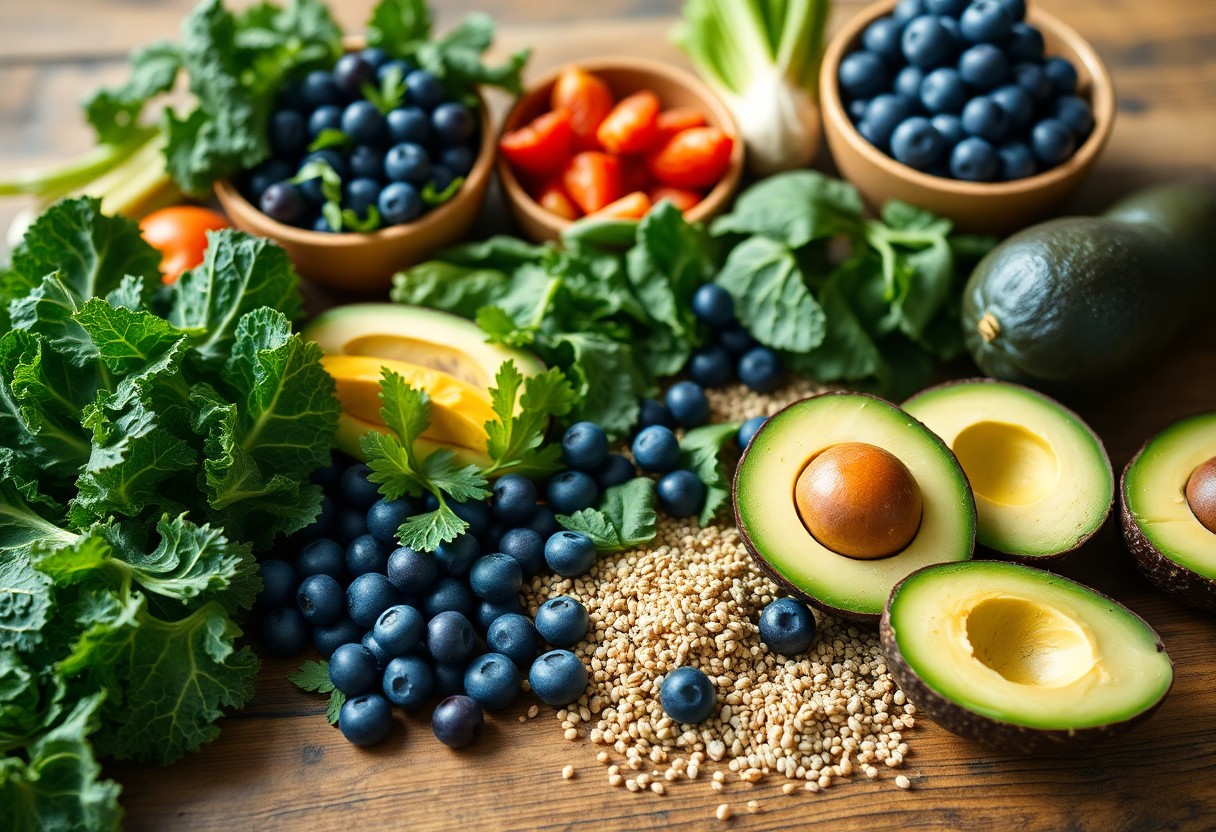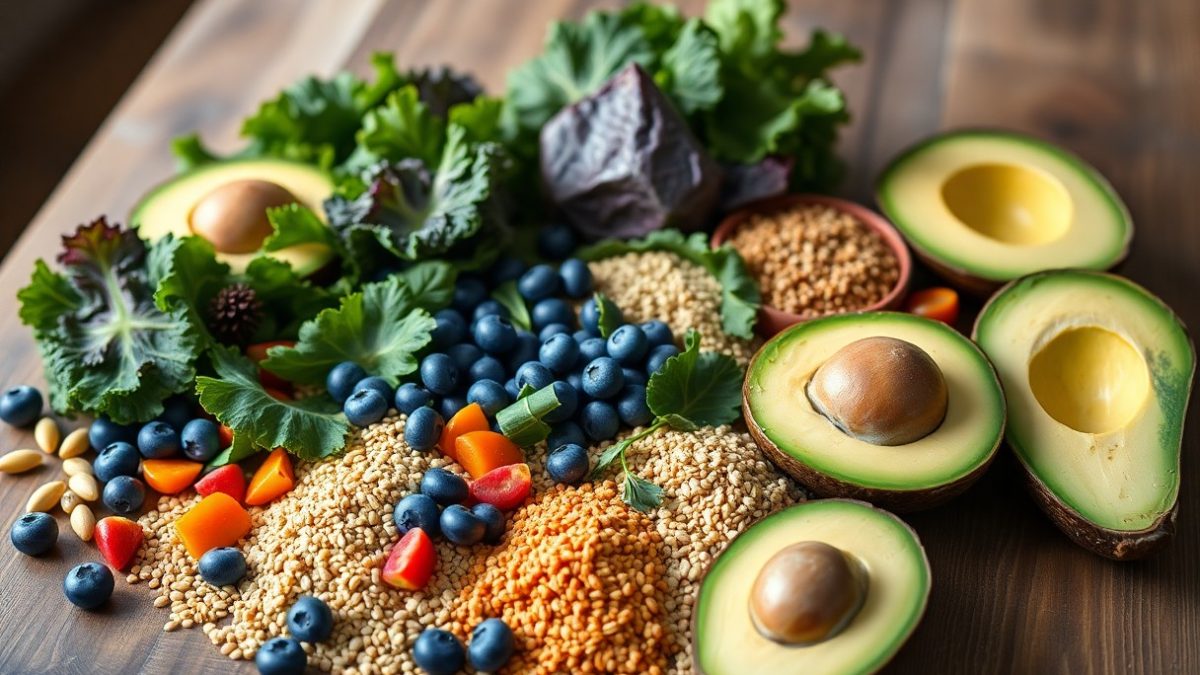Superfoods Explained – What They Are And Why You Need Them

Easy Superfood Recipes For Quick And Healthy Meals
October 31, 2024
Incorporating Superfoods Into Your Daily Cooking Routine
November 4, 2024Just when you thought you had a handle on healthy eating, the term superfoods enters the conversation, promising to transform your nutrition game. These nutrient-packed foods offer an abundance of health benefits that can enhance your well-being and mitigate serious concerns like chronic disease. By integrating superfoods into your meals, you’re not only boosting your energy levels but also fostering a diet rich in vitamins, minerals, and antioxidants. Discover how these powerhouses can elevate your health, making you feel your best every day.
Key Takeaways:
- Definition: Superfoods are nutrient-dense foods that provide health benefits beyond basic nutrition.
- Health Benefits: Regular consumption of superfoods can enhance overall health, boost immunity, and reduce the risk of chronic diseases.
- Diversity: Incorporating a variety of superfoods into your diet, such as berries, leafy greens, and nuts, can maximize nutritional benefits.

Defining Superfoods
The term “superfoods” refers to nutrient-dense foods that offer exceptional health benefits. While there is no official definition, these foods are typically rich in vitamins, minerals, and antioxidants that contribute to overall well-being. Incorporating superfoods into your diet can help support various bodily functions and improve your health profile.
Nutritional Powerhouses
Across the spectrum of healthy eating, superfoods stand out as your nutritional powerhouses. They pack a high concentration of beneficial compounds, including proteins, healthy fats, and a variety of crucial nutrients that can aid in disease prevention and health enhancement.
Common Characteristics
Common characteristics of superfoods include high nutrient density, rich antioxidant content, and anti-inflammatory properties. These foods often contain compounds that promote heart health, boost the immune system, and enhance cognitive function.
This focus on nutrient density means that superfoods provide more vitamins and minerals per calorie than other foods, which supports your overall diet. In addition, their antioxidant properties help combat oxidative stress and inflammation, which are linked to various chronic diseases. Many superfoods also contain bioactive compounds that aid in digestion and metabolic health. By including a variety of these foods in your meals, you can enjoy a balanced and health-promoting diet.
Health Benefits of Superfoods
You may be wondering how superfoods can transform your health. These nutrient-dense foods are rich in vitamins, minerals, and antioxidants, which can enhance your overall well-being. Incorporating superfoods into your diet can lead to improved energy levels, better digestion, and reduced inflammation, all of which contribute to a healthier lifestyle. The diverse range of health benefits offered by superfoods makes them an vital component of your daily nutrition.
Disease Prevention
Before stepping into the specifics, it’s vital to recognize that a well-rounded diet including superfoods can significantly help in preventing chronic diseases. Many superfoods possess anti-inflammatory and antioxidant properties that can combat oxidative stress, a leading factor in the development of conditions such as heart disease and diabetes. By choosing superfoods regularly, you can take proactive steps in safeguarding your long-term health.
Boosting Immune Function
Immune health is vital for preventing illnesses and infections, and superfoods can play a vital role in enhancing your immune system. They provide a wealth of nutrients that support your body’s defensive mechanisms, helping you stay healthy throughout the year.
In addition, superfoods like berries, garlic, and citrus fruits are packed with vitamins and minerals, such as vitamin C and zinc, which are known to boost your immune function. Regular consumption of these foods can lead to a more robust immune response, reducing your susceptibility to colds, flu, and other infections. Also, the antioxidants found in superfoods help neutralize harmful free radicals in your body, further supporting your immune health. Prioritizing superfoods can make a noticeable difference in how well your body combats illness.
Popular Superfoods
Now that you understand what superfoods are, let’s explore some of the most popular options available. These nutrient-dense foods are not only delicious but also offer immense health benefits, helping to enhance your well-being and improve your energy levels. From berries to leafy greens, each superfood comes packed with unique properties that you can incorporate into your daily diet for a healthier lifestyle.
Berries
One of the standout superfoods, berries are renowned for their rich antioxidant content. Blueberries, strawberries, and raspberries not only provide a burst of flavor but also help fight inflammation and oxidative stress in your body. Enjoy them fresh, blended in smoothies, or sprinkled on your morning yogurt to reap their numerous health benefits.
Leafy Greens
Behind the vibrant colors of leafy greens lies an abundance of vital vitamins and minerals. These powerhouses, including spinach, kale, and Swiss chard, offer significant health benefits, such as improved digestion and reduced risk of chronic diseases. Adding leafy greens to your meals is a simple yet effective way to boost your nutrient intake.
Leafy greens are not just low in calories; they are also incredibly nutrient-dense, providing vital vitamins like A, C, and K, as well as minerals such as iron and calcium. They contain fiber, which promotes digestive health, and are often associated with lowered risk of heart disease and improved bone health. By incorporating these greens into your diet, you can effortlessly enhance your nutritional profile while enjoying their versatility in salads, smoothies, and stir-fries.
How to Incorporate Superfoods into Your Diet
All superfoods can easily be added to your meals with a bit of creativity. Start by including them in your breakfast, snacks, or smoothies. You can sprinkle chia seeds on yogurt, add kale to your morning smoothie, or toss quinoa into salads for an added health boost. Experiment with different combinations to find what you enjoy!
Meal Planning Tips
Between your busy schedule and meal prepping, incorporating superfoods can be seamless when you plan ahead. Here are some tips to help you:
- Choose a variety of superfoods each week.
- Make a grocery list focused on nutrient-dense foods.
- Prepare your meals in bulk for convenience.
Recognizing the impact of superfoods on your overall health can motivate you to make them a regular part of your diet.
Simple Recipes
Planning your meals around simple recipes featuring superfoods can enhance your culinary experience and nutritional intake. Quick and easy recipes can showcase the flavors and benefits of superfoods such as blending acai into smoothies, tossing spinach into omelets, or creating salads with avocado and quinoa.
Considering your health goals and taste preferences, finding simple recipes can transform your meals. Look for superfood-infused dishes that are not only easy to prepare but also delicious. By combining ingredients like blueberries and oats in overnight oats or mixing turmeric into soups, you can create flavorful meals that nourish your body. Embrace the positive impact these recipes can have on your overall well-being, and let your kitchen become a place of health transformation.
Myths and Misconceptions About Superfoods
Despite their popularity, many myths and misconceptions surround superfoods. Some people believe that consuming these foods alone can lead to miraculous health improvements. However, as detailed in 16 Superfoods That Are Worthy of the Title, it’s important to remember that a balanced diet contributes more significantly to your overall health than a few individual foods.
Marketing vs. Reality
About the world of superfoods, marketing often exaggerates their benefits while overlooking their limitations. Companies frequently promote these foods as miracle solutions for weight loss or chronic illnesses, leading to unrealistic expectations. Understanding the reality of what superfoods can offer helps you make better choices for your *health*.
Individual Dietary Needs
Myths can mislead you into thinking superfoods are universally beneficial for everyone. In reality, your unique dietary requirements dictate how certain superfoods affect you. Not all superfoods suit your lifestyle, and disregarding this can lead to *nutritional imbalances*.
Also, keep in mind that while some superfoods may offer *added health benefits*, they can also cause *adverse reactions* in individuals due to allergies or dietary restrictions. Your focus should be on a diverse and balanced diet that meets your unique needs, as what is *beneficial* for one person may not be for you. Prioritize foods that support your overall *well-being* rather than accumulating trendy superfoods that may not serve your health objectives.
The Role of Superfoods in a Balanced Diet
To achieve a well-rounded nutritional profile, it’s necessary to incorporate superfoods into your daily meals. These nutrient-dense options can significantly enhance your overall health by providing vitamins, minerals, and antioxidants. By including superfoods, you can boost your energy levels, support your immune system, and reduce the risk of chronic diseases, allowing your body to function at its best.
Superfoods vs. Whole Foods
Behind the hype of superfoods, it’s important to differentiate them from whole foods. While superfoods are often marketed for their exceptional health benefits, whole foods are minimally processed and come packed with a variety of nutrients necessary for your well-being. Both have significant roles in your diet, and combining them can provide the best nutritional outcomes.
Personalizing Nutritional Choices
An individualized approach to nutrition is fundamental when incorporating superfoods into your diet. What works for one person may not work for another; understanding your unique dietary needs and preferences is vital for achieving optimal health.
With a keen awareness of your body’s requirements, you can tailor your intake of superfoods to genuinely boost your health. Consider aspects such as allergies, digestive issues, or specific health goals when choosing which superfoods to include. Emphasizing variety and balance while focusing on whole foods will further enhance the benefits of superfoods in your diet, ensuring that you support your overall health effectively.
To wrap up
With this in mind, incorporating superfoods into your diet can significantly enhance your overall health and well-being. These nutrient-dense foods provide your body with the vitamins, minerals, and antioxidants necessary for optimal functioning. By making deliberate choices to include a variety of superfoods, you empower yourself to boost energy levels, strengthen your immune system, and support long-term health. Embrace the opportunity to explore these powerful foods and enjoy the benefits they bring to your life.
Q: What are superfoods and what makes them special?
A: Superfoods are nutrient-dense foods that are packed with vitamins, minerals, antioxidants, and other beneficial compounds. They provide a wide array of health benefits and are typically whole, unprocessed foods such as fruits, vegetables, nuts, seeds, and grains. What makes them special is their ability to support overall health, enhance the immune system, and help combat chronic diseases due to their high concentrations of nutrients.
Q: How can including superfoods in my diet benefit me?
A: Incorporating superfoods into your diet can lead to numerous health benefits. These foods can help improve digestion, boost energy levels, promote heart health, and even enhance mental clarity. They often possess anti-inflammatory properties and can provide support against conditions like diabetes and obesity. By adding a variety of superfoods to your meals, you can create a well-rounded and healthy diet that supports your overall well-being.
Q: Are there any specific superfoods that I should focus on incorporating?
A: While there are many superfoods out there, some popular ones to consider include berries (like blueberries and acai), leafy greens (like kale and spinach), nuts (such as almonds and walnuts), chia seeds, quinoa, and fatty fish (like salmon and sardines). Each of these foods offers unique health benefits, so focusing on a diverse selection can help you maximize the nutritional value of your diet. It’s important to combine them with other healthy foods for an even more balanced intake.
NEWSLETTER







